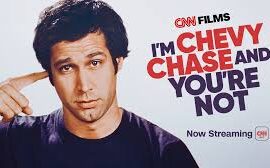
The headline on John Doyle’s TV column Monday in The Globe and Mail said it all: “American late-night is reinvigorated. In Canada, we’ve got nothing.”
Sad but true.
Doyle points out that the gloves are so far off in American late night circles when it comes to political commentary you can see the bare knuckles. Seth Meyers, Samantha Bee, Jimmy Kimmel, John Oliver and others are holding politicians and media feet to fire night after night, like never before.
The U.S. late night scene wasn’t always so emboldened. Next Sunday’s third episode of CNN’s excellent documentary series The Story of Late Night gets into how, 30 years ago, late night in America went from Johnny Carson’s monopoly to a vigorous battle between David Letterman and Jay Leno with Conan O’Brien, Arseno Hall and others joining in.
Besides getting more political throughout the Trump years, the field has grown larger and much more diverse. NBC, however, just announced that they will not be renewing A Little Late with Canadian Internet sensation Lilly Singh for a third season.
One point made in The Story of Late Night is that it is very much an American phenomenon. The UK has The Graham Norton Show but it airs there on Friday nights, not really in late night. Germany had a replica of The Late Show with David Letterman which copies the original in look and manner, although it had a much smaller writing staff. The Story of Late Night executive producer Bill Carter explains why in an outrageously funny story he tells on the current episode of brioux.tv: the podcast.
advertisement
Carter figures America rocks late night because no other country has such easy, bi-coastal access to such a large pool of entertainment industry talent. True, although one country comes close: Canada. That has been especially true in the past 14 months when movie, TV and music stars are all the same zoom call away from Canada as they are for Kimmel, Jimmy Fallon, Trevor Noah or Stephen Colbert.
Back before COVID times, Mike Bullard managed to book enough talent coming in and out of Toronto to sustain a six-season run with Open Mike (1997-2003). This was especially true during film festivals. Toronto is such an engergized production hub now, with show such as The Handmaid’s Tale, Star Trek: Discovery and What We Do in the Shadows shooting in the GTA, that big name guests would be even more accessible.
Trouble is, Canadian networks are already crammed full with American late night content. That’s the irony: CNN’s The Story of Late Night is produced by a Toronto company — Cream Productions. Once again: we can tell their story but not build our own.
I ran into Bullard a few years ago and asked if he wanted to be in late night in Canada today. His answer: “Sure, great — I get to go head-to-head with 12 American shows instead of three.”
Meanwhile, as Doyle points out, all we have in Canada in late night to take issue with political stupidity is “At Issue” on CBC’s The National. That, it seems, is our sad story of late night.






